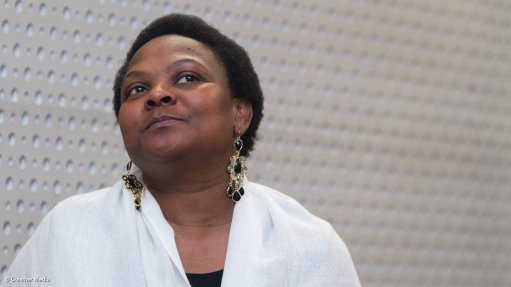
ECSA council member Nelisiwe Magubane
Photo by: Duane Daws
Young South African engineers should be paid as much as merchant bankers if the country wants to stop them from heading into more lucrative fields or seeking work opportunities abroad, says Engineering Council of South Africa (ECSA) council member and former director-general of the Department of Energy Nelisiwe Magubane.
“We can invest as much as we like on young engineers and then they become merchant bankers. ECSA has a role to play to ensure we promote the engineering profession to ensure we keep our engineers here.”
Magubane later told Engineering News Online that the power sector, in particular, needed to try to match the salaries paid by the banking sector. She said a shortage of engineers meant that many municipalities went without the technical know-how and leadership needed in the energy field.
Magubane, who is also chairperson of Matleng Energy Solutions, said registered engineers should be technical directors in municipalities. She also called on Eskom to do more to make it attractive for engineers to work at the power utility.
Meanwhile, Johannesburg City Power MD Sicelo Xulu said the trend towards smart metering was growing rapidly.
“From a retail point of view, we’re seeing great transformation, including digitisation in the industry, a major drive around big data and smart meters.”
He said these changes would lead to more efficiency and better service and would help to reduce the number of outages in municipalities.
He added that municipalities needed to adapt to a changing industry.
“We need to look at some sort of change. Electricians should not be carrying around two boxes. Instead they should soon be carrying laptops to sort out problems. We need to be upskilled in the industry,” he told delegates at the PowerGen conference.
A shift in attitude was also needed. He said municipalities were still struggling with the concept of renewable energy because of the threat to their revenues.
“Africa, together with the Middle East, is still lagging behind in renewables. Europe is far ahead of the game. We need to grow our share to participate in terms of renewable energy and allow them to be part of the energy mix.”
Xulu said South Africans would need to face up to the reality that the need for renewables would continue to rise.
“Fossil fuel will play a role but it will be overtaken by renewables. We need to become drivers of this partnership, rather than passengers.”
The City of Johannesburg was also trying to address other challenges, such as widespread copper theft and vandalism, illegal connections and skills and capacity shortages.
Xulu said it was difficult to introduce new technology, while at the same time trying to build up the skills base.
“Utilities need to innovate across the value chain to derive competitive advantage and turn disruptive threats into opportunities,” he stated.